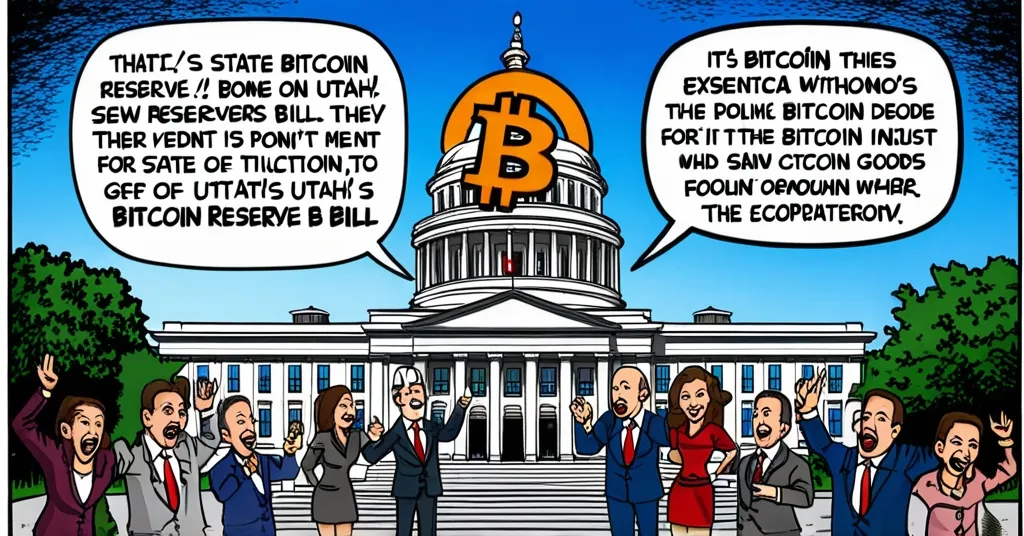Utah’s Historic Bitcoin Reserve Bill Advances to Senate, Eyes on Final Vote

Utah Advances Bitcoin Reserve Bill, Nears Final Senate Vote
Utah is on the brink of making history as the first U.S. state to officially recognize Bitcoin as a reserve asset, with its groundbreaking bill, HB230, advancing to a crucial Senate vote. As a champion of financial innovation, Utah’s move could be a game-changer for the crypto world, yet it’s essential to keep an eye on the challenges ahead.
- Utah’s HB230 advances to Senate vote
- Up to 5% of public funds can be invested in Bitcoin
- Bill allows crypto staking and use of trusted storage services
- Montana also progresses with similar legislation
With a 4-2-1 vote, Utah’s Senate Revenue and Taxation Committee has pushed HB230 closer to becoming law. The bill now awaits a second and third reading before a final Senate vote. If it passes these hurdles, it will land on Governor Spencer Cox’s desk for approval. Imagine if Utah becomes the trailblazer in recognizing Bitcoin as a reserve asset! The bill empowers the state treasurer to allocate up to 5% of certain public funds into Bitcoin, high-cap cryptocurrencies, and stablecoins. It also allows for crypto staking, which involves holding funds in a cryptocurrency wallet to support the operations of a blockchain network, earning rewards in return. To ensure security, the funds must be held by trusted storage services or through investment funds.
While Utah is pushing the envelope, it’s not alone in this race. Montana has also made significant strides with its own Bitcoin reserve bill, advancing it with a 12-8 vote. Montana’s approach is more focused, limiting eligible digital assets to those with a market cap exceeding $750 billion over the past year, essentially targeting Bitcoin. This nuanced strategy highlights the diversity in how states are integrating cryptocurrencies into their financial systems.
Utah’s legislative process, operating on a swift 45-day calendar, gives it a clear advantage over other states. Dennis Porter, the founder of the Satoshi Act Fund, commented on Utah’s momentum, stating:
“No one else has a faster calendar, and no one else has more political momentum and willpower to get it done.”
However, not all states are on board. Wyoming, North Dakota, and Pennsylvania have rejected similar proposals, underscoring the challenges and resistance faced in this movement. Critics argue that investing public funds in Bitcoin is risky due to its notorious volatility. They believe that these funds should be safeguarded against such market fluctuations, which could lead to significant financial losses.
The broader context of these state-level initiatives is also influenced by federal developments. U.S. Senator Cynthia Lummis’s efforts to establish a Bitcoin reserve bill at the federal level could have significant implications for state legislation. If Utah’s HB230 passes and is signed into law, it would not only make Utah the first state to officially recognize Bitcoin as a reserve asset but could also set the stage for a national policy shift.
While the optimism around Bitcoin and blockchain technology is palpable, it’s crucial to remain realistic about the challenges ahead. The integration of cryptocurrencies into traditional financial systems is not without risks, such as market volatility and regulatory hurdles. Yet, the potential for decentralization and financial innovation remains a compelling narrative driving these legislative efforts.
As we watch Utah and other states navigate this uncharted territory, the question remains: will these efforts lead to a new era of financial freedom and innovation, or will they face insurmountable challenges? Only time will tell, but for now, Utah’s progress is a beacon of hope for cryptocurrency enthusiasts and a testament to the growing acceptance of digital assets. Utah’s not just famous for its ski slopes anymore; it might soon be known for its crypto slopes too.
Key Takeaways and FAQs on Utah’s Bitcoin Reserve Bill
- What is the current status of Utah’s Bitcoin reserve bill?
The bill has passed the Senate Revenue and Taxation Committee and is awaiting a second and third reading before a final Senate vote.
- What does the bill propose?
It proposes allowing the state treasurer to allocate up to 5% of certain public funds into Bitcoin and other digital assets, and to engage in crypto staking.
- How does Utah’s legislative process compare to other states?
Utah operates on a 45-day legislative calendar, which is faster than many other states, giving it an advantage in passing the bill.
- What is the significance of Utah potentially establishing a Bitcoin reserve?
It would make Utah the first U.S. state to officially recognize Bitcoin as a reserve asset, potentially setting a precedent for other states.
- What other states are considering similar legislation?
Currently, 20 U.S. states are considering holding cryptocurrencies as reserve assets, with Montana, Arizona, and Oklahoma also advancing similar bills.
- What challenges have other states faced in passing similar bills?
Wyoming, North Dakota, and Pennsylvania have rejected similar proposals, indicating some resistance or challenges in passing such legislation.
- How does Montana’s bill differ from Utah’s?
Montana’s bill specifies a $750 billion market cap requirement for eligible digital assets and has removed the custodian requirement, contrasting with Utah’s approach.
- What are the potential federal implications of these state-level bills?
U.S. Senator Cynthia Lummis’s efforts to establish a Bitcoin reserve bill at the federal level could be influenced by state successes, potentially leading to a national policy shift.



